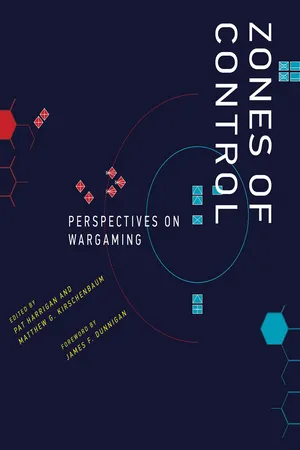
Zones of Control
Perspectives on Wargaming
- English
- ePUB (mobile friendly)
- Available on iOS & Android
Zones of Control
Perspectives on Wargaming
About this book
Games with military themes date back to antiquity, and yet they are curiously neglected in much of the academic and trade literature on games and game history. This volume fills that gap, providing a diverse set of perspectives on wargaming's past, present, and future. In Zones of Control, contributors consider wargames played for entertainment, education, and military planning, in terms of design, critical analysis, and historical contexts. They consider both digital and especially tabletop games, most of which cover specific historical conflicts or are grounded in recognizable real-world geopolitics. Game designers and players will find the historical and critical contexts often missing from design and hobby literature; military analysts will find connections to game design and the humanities; and academics will find documentation and critique of a sophisticated body of cultural work in which the complexity of military conflict is represented in ludic systems and procedures.
Each section begins with a long anchoring chapter by an established authority, which is followed by a variety of shorter pieces both analytic and anecdotal. Topics include the history of playing at war; operations research and systems design; wargaming and military history; wargaming's ethics and politics; gaming irregular and non-kinetic warfare; and wargames as artistic practice.
Contributors
Jeremy Antley, Richard Barbrook, Elizabeth M. Bartels, Ed Beach, Larry Bond, Larry Brom, Lee Brimmicombe-Wood, Rex Brynen, Matthew B. Caffrey, Jr., Luke Caldwell, Catherine Cavagnaro, Robert M. Citino, Laurent Closier, Stephen V. Cole, Brian Conley, Greg Costikyan, Patrick Crogan, John Curry, James F. Dunnigan, Robert J. Elder, Lisa Faden, Mary Flanagan, John A. Foley, Alexander R. Galloway, Sharon Ghamari-Tabrizi, Don R. Gilman, A. Scott Glancy, Troy Goodfellow, Jack Greene, Mark Herman, Kacper Kwiatkowski, Tim Lenoir, David Levinthal, Alexander H. Levis, Henry Lowood, Elizabeth Losh, Esther MacCallum-Stewart, Rob MacDougall, Mark Mahaffey, Bill McDonald, Brien J. Miller, Joseph Miranda, Soraya Murray, Tetsuya Nakamura, Michael Peck, Peter P. Perla, Jon Peterson, John Prados, Ted S. Raicer, Volko Ruhnke, Philip Sabin, Thomas C. Schelling, Marcus Schulzke, Miguel Sicart, Rachel Simmons, Ian Sturrock, Jenny Thompson, John Tiller, J. R. Tracy, Brian Train, Russell Vane, Charles Vasey, Andrew Wackerfuss, James Wallis, James Wallman, Yuna Huh Wong
Frequently asked questions
- Essential is ideal for learners and professionals who enjoy exploring a wide range of subjects. Access the Essential Library with 800,000+ trusted titles and best-sellers across business, personal growth, and the humanities. Includes unlimited reading time and Standard Read Aloud voice.
- Complete: Perfect for advanced learners and researchers needing full, unrestricted access. Unlock 1.4M+ books across hundreds of subjects, including academic and specialized titles. The Complete Plan also includes advanced features like Premium Read Aloud and Research Assistant.
Please note we cannot support devices running on iOS 13 and Android 7 or earlier. Learn more about using the app.
Information
Table of contents
- Cover
- Series page
- Title page
- Copyright page
- Dedication
- Table of Contents
- Editors’ Introduction
- Series Foreword
- Foreword: The Paper Time Machine Goes Electric
- I Paper Wars
- II War Engines
- III Operations
- IV The Bleeding Edge
- V Systems and Situations
- VI The War Room
- VII Irregularities
- VIII Other Theaters
- IX Fight the Future
- Acknowledgments and Permissions
- References
- Index